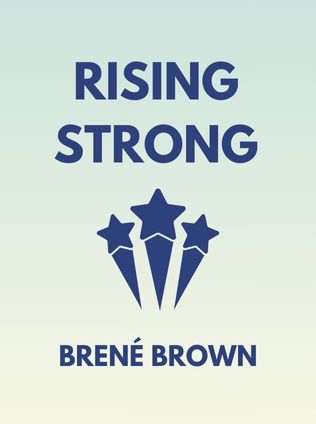
Rising Strong
The Reckoning. The Rumble. The Revolution.
By Brené Brown
Published 08/2015
About the Author
Brené Brown is a renowned research professor, author, and public speaker who has dedicated her career to exploring the complex themes of courage, vulnerability, shame, and empathy. With a PhD in social work, Brown has spent over two decades studying these topics and their impact on human connection and personal growth. She is the author of multiple #1 New York Times bestsellers, including "The Gifts of Imperfection," "Daring Greatly," and "Dare to Lead." Her work has inspired millions worldwide, particularly through her 2010 TEDx talk, "The Power of Vulnerability," which has become one of the most viewed TED talks of all time. Brown's unique ability to blend research with personal storytelling has made her a leading voice in discussions about how embracing vulnerability can lead to a more authentic and fulfilling life.
Main Idea
"Rising Strong" is a profound exploration of the human experience of failure, disappointment, and heartbreak. Brené Brown argues that these emotional setbacks, while painful, are necessary for personal growth and living a wholehearted life. The book presents a three-stage process—The Reckoning, The Rumble, and The Revolution—that individuals can follow to recover from emotional wounds and build resilience. Brown emphasizes that the act of rising strong after a fall is not just about regaining our footing but about fundamentally transforming how we live, how we connect with others, and how we understand ourselves. Through vulnerability, self-reflection, and courage, we can turn our struggles into opportunities for deeper connection and greater authenticity.
Table of Contents
- The Physics of Vulnerability
- Civility and Hurt
- Owning Our Stories
- The Rumble
- The Reckoning
- The Revolution
- Mind the Gap
- Finding the Truth
- The Rising Strong Process
The Physics of Vulnerability
In the opening chapter, Brené Brown introduces the concept of vulnerability as a fundamental aspect of the human condition. She explains that vulnerability is not a sign of weakness, as many might assume, but rather the birthplace of love, belonging, joy, courage, and creativity. According to Brown, vulnerability is the willingness to show up and be seen, even when the outcome is uncertain. She likens it to a form of emotional exposure, where we risk rejection, criticism, and failure in the pursuit of authentic connection.
Brown uses the metaphor of "The Physics of Vulnerability" to illustrate that just as physical laws govern the material world, there are inherent principles that govern our emotional experiences. These principles suggest that when we open ourselves up to others, we inevitably encounter emotional pain. However, it is through this pain that we grow and develop resilience. Brown writes:
"Vulnerability is not winning or losing; it's having the courage to show up and be seen when we have no control over the outcome." - Brené Brown
This quote encapsulates the essence of Brown's message: that vulnerability is a courageous act, and it is only by embracing it that we can truly experience the richness of life. The idea that vulnerability is at the heart of all meaningful human experiences sets the tone for the entire book, as Brown delves deeper into the process of rising strong after emotional setbacks.
Civility and Hurt
In the chapter titled "Civility and Hurt," Brown addresses the importance of maintaining civility in our interactions with others, even when we are hurt. She argues that it is easy to lash out in anger or frustration when we feel vulnerable or wronged, but true strength lies in responding with respect and dignity. This chapter is particularly relevant in today's social and political climate, where discourse often devolves into hostility and division.
Brown challenges readers to take responsibility for their own emotions and to avoid spreading their hurt by lashing out at others. She emphasizes that civility is not about suppressing our emotions but about expressing them in a way that fosters understanding and connection rather than conflict. She writes:
"Our job is to take responsibility for our own hurt and experience and not spread it by lashing out." - Brené Brown
This concept is crucial for understanding how we can avoid perpetuating cycles of pain and instead focus on healing. Brown encourages readers to own their emotions, rather than project them onto others, as a means of building healthier relationships. By practicing civility, even in the face of hurt, we can create a more compassionate and empathetic world.
Sign up for FREE and get access to 1,400+ books summaries.
You May Also Like
The Subtle Art of Not Giving a F*ck
A Counterintuitive Approach to Living a Good Life
By Mark MansonRich Dad Poor Dad
What the Rich Teach Their Kids About Money - That the Poor and Middle Class Do Not!
By Robert T. KiyosakiHow To Win Friends and Influence People
The All-Time Classic Manual Of People Skills
By Dale CarnegieFreakonomics
A Rogue Economist Explores the Hidden Side of Everything
By Steven D. Levitt and Stephen J. Dubner



















